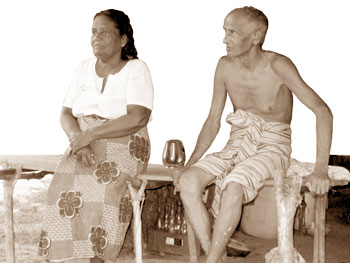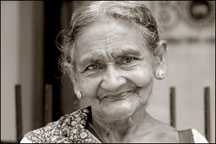|
International Elders Day:
Is the nation prepared to face the challenge?
by Indeewara Thilakarathne
As Sri Lanka joins the world community in celebrating yet another
International Elders' Day, the focus has, once again, been on the
increasing population ageing and its widespread long term repercussion
on the entire social fabric.
 Sri Lanka experiencing a major demographic shift in the age pyramid
from younger population to older, the proportion of the population over
60 years has dramatically increased from 5.3 in 1953 to 10.8 per cent in
2003, making it the fastest ageing population among the developing
nations. Sri Lanka experiencing a major demographic shift in the age pyramid
from younger population to older, the proportion of the population over
60 years has dramatically increased from 5.3 in 1953 to 10.8 per cent in
2003, making it the fastest ageing population among the developing
nations.
It has been forecast that the ageing population will further rise to
one quarter of Sri Lanka's population by 2030. It is apparent that this
ageing population will put an added strain on Sri Lankan economy which
is already being affected by terrorism and the declining tourist
arrivals, tourism being one of the principle sources of foreign
exchange.
The time is ripe for the policy makers to take this issue into
consideration given the profound impact that this shift of paradigm
would make on the economy and the society at large.
Regional-wise the ageing population over 60 -70 has almost double
compared to other countries in South East Asia in 2001 and 2030. In
2001, one person among ten is over 60 which is 1 in 21 and 13 people in
Afghanistan and India.
According to the forecast, by 2030 Sri Lanka will expect to have 22
per cent of population age over 60 or 1 in 5 over 60. However, other
countries in the region are expected to have a somewhat lower rate, 1 in
18 in Afghanistan and 1 in 7 in India.
The situation is further compounded by the unprecedented increase in
the median age in Sri Lanka, from 26.9 in 2000 to 39.2 per cent in 2030.
The shift of paradigm
Observing the demographic changes that took place since the first
census conducted in 1871 and the last in 2001, there is a shift of
paradigm of young population which steadily rose before 1950 up to 1971
with the increase in fertility rate and due to the rapid decline of
infant mortality (IMR) and maternal mortality rates (MMR), to the older
population over 60 -70.
Since 1990's a major shift of age structure is observed virtually
changing the age pyramid. Decrease in fertility rate and increase life
expectancy has contributed to this demographic transition. However, this
will pose major economic and social challenges as it occurred against
the slow economic growth.
Although the traditional Sri Lankan family cares for elders, this
trend is changing with a large number of females migrant workers seeking
better employment abroad and a large number of rural youth migrating to
cities in search of job opportunities. According to the Department of
Social Service, number of homes for the elders has increased from 68 in
1987 to 162 in 2003.
This figure excludes the paying homes for elders set up in some urban
areas. Sri Lanka had a baby boom about twenty five years ago. This has
increased the dependency rate. With the improvement of life expectancy
due to the advancement in medical care, Population ageing increased and
it will also increase the dependency rate.
However, this has not significantly affected the ordinary family as
it was a demographic change from babies to elders. The number of
dependency in a household remain static.
Structural change is needed in the economy to cater to population
ageing. The facilities such as healthcare, pension. As the Government
cannot run pension schemes. The economy has to provide pension to cater
to population above 60 years.
As the Government has to allocate more resources on pensions, it will
reduce resources for vital sectors negatively affecting the economic
growth.
This will decrease domestic consumption and as it is one of the
sources of economic growth, the economic growth will suffer. This will
also reduce savings and create a vicious circle.
People should change their attitudes and go for new social security
schemes such as saving while earning. People's attitude should also
change, said Chandana Aluthge, Senior Lecturer in Economics University
of Colombo.
Demographic situation
As most Sri Lankans are engaged in unproductive economic activities
such as whole sale and retail businesses, real production process is not
taking place within the economy.
The population figures have been neglected by policy makers. Policy
makers should understand the rapid ageing process in order to tackle
issues emerging from it. Economic restructuring is required so as to
provide employment opportunities for persons over 60 as they live 17-23
years after retirement (male 17 years and females 23 years). Measures
such as compulsory age of retirement could be extended up to 65.
Lack of social security schemes, primary care-givers for elderly and
no proper income for elderly females who could not engage in gainful
economic activities given their low level of education, are some of the
issues emerging from population ageing.
Socio-economic implications
The economic implications of the ageing population will extend to the
areas of social security schemes such as pension, ETF, EPF to the health
sector where considerable expenditure will be incur from special drugs
for elders and from the improvement of infrastructure to cater to their
specific requirements.
Against the rising inflation, the EPF, ETF or a lump sum received at
retirement is insufficient to cover day-to-day expenditure on medicine.
They also cannot depend on interest rates as interest rates are low.
This situation would further worsen given the impact the government
pension schemes make on the Gross Domestic Production (GDP).
Expenditure on pension per GDP has risen from 2.4 per cent in 1994 to
4.2 per cent in 2002.
In the health sector, facilities to treat chronic illness such as
heart disease, kidney failures, censer would have to be increased and it
is expected that sanitariums for bed-ridden elders and the government
will have to spend a large amount of money on expensive drugs for the
elders to treat chronic diseases and expand theatre and dialysis
facilities for patients suffering from kidney failures.
Tribal burden on working population
The age dependency ratio which indicates a number of persons depend
on the work force is also expected to rise further burdening the
economy. According to Department of Census and Statistics, the aged
dependency ratio has increased from 9.4 per cent in 1946 to 15.4 per
cent in 2001 and is expected to increase to 41 per cent in 2041. Six
workers support one aged in 2001 will rise to two workers supporting one
aged by 2041.
It is high time that policy makers take the population factor into
consideration in formulating development plans as this vital factor will
adversely affect the long term prospects of realizing development goals.
[email protected]
If tomorrow never comes...
by Rosanne Koelmeyer Anderson
 The syndrome is irreversible as solitude, seclusion and some times
even isolation takes the better of them. Closing in on ones sixties, the
ageing process seems to find no solace but a void instead; loneliness
and emptiness the only companions left to run the rest of the race, till
death do us part. The syndrome is irreversible as solitude, seclusion and some times
even isolation takes the better of them. Closing in on ones sixties, the
ageing process seems to find no solace but a void instead; loneliness
and emptiness the only companions left to run the rest of the race, till
death do us part.
Sad, yet so challenging, a fact of life, irrevocable. Today being
International Elders' Day makes us stop to ponder on the facts of life;
are we ready to face actuality sooner or later like those yearning for
the tender loving care of their children and kith and kin.
Where have all the flowers gone? Once a paradise wrapped in the
warmth of the love and care of their children, their home is now a home
far away from home, a life of yearning and tears; an Elders' Home, a
common phenomenon in Sri Lanka today.
Visiting the Homes and speaking to these elders you would only see
sorrow, distress and pain; so hurting and helpless as it were all around
you that surpasses all understanding as it seems and engulfs you too
into deep emotional anguish.
Their common cry of woe, to see their son or a daughter soon or
nostalgic memories of their unforgettable ancestral home and the feeling
of belonging, seems lost in time. For some of them months and years have
gone by, 'the children and grandchildren have no time' to spare to make
a telephone call and inquire-not even glance at them some times as they
pass by, so near and yet so far are the lives of most children today.
No second to the developed world, we Sri Lankans have also fallen
into the same trend, a throwaway culture.
Alarmingly, statistics of the seminar on the Social Health and
Economic consequences of ageing population held in Bangkok in August
reveals that fifty two per cent of the world's ageing population is in
the Asia Pacific region and will rise to 59 per cent by 2025 while the
Population Division, Department of Economic and Social Affairs, United
Nations Secretariat says that as the tempo of ageing in developing
countries is more rapid than in developed countries, developing
countries will have less time than the developed countries to adapt to
the consequences of population ageing.
As a result the impact on the social, economical and health
implications of these older persons will be a major challenge faced by
many countries in the region, including Sri Lanka.
As the traditional means of family support are steadily eroding in
most societies and healthcare infrastructure is already weak in many
countries of the region, the additional burden of caring for older
persons will further stretch it.
The rising number of older persons on the one hand and the declining
number of younger population on the other will mean that there will be a
shortage of caregivers for the older population.
This is soon becoming a reality and a huge crisis in the developing
world. Statistics also show that this could be attributed to the fact
that many youngsters have moved to main cities from the rural areas
leaving behind their elderly parents in their villages, in search of
healthier employment opportunities for the betterment of their economy
and future, nearly another 1 million are engaged in the country's
longstanding civil war, in the war front, far away from their homes,
More than 2 million have gone abroad seeking employment and another 1
million, educated professionals, skilled or otherwise have migrated to
other countries seeking better prospects among the reasons for the
shortage of care givers.
With yet another International Elders' Day celebrations let us make a
firm pledge today to go that extra mile for the elders in our society
and have no regret, for tomorrow may never come". |
